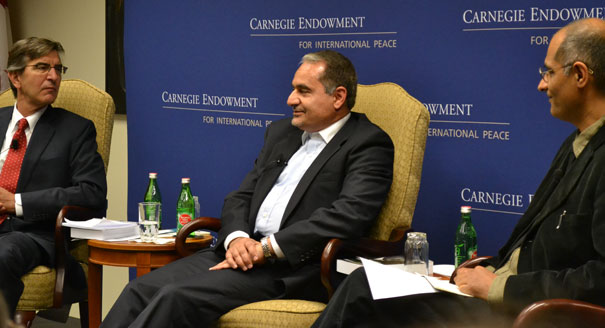Registration
You will receive an email confirming your registration.
Seyed Hossein Mousavian, who served as a member and spokesman for Iran’s nuclear negotiating team from 2003 to 2005 and as head of the Foreign Relations Committee of Iran’s National Security Council from 1997 to 2005, discussed his new book, The Iranian Nuclear Crisis: A Memoir, a first-of-its kind insider account of the Iranian nuclear crisis. Mousavian analyzed the misperceptions and mistakes by the West and by Iran that have driven the current nuclear stand-off and outlined what a nuclear agreement needs to include for it to be acceptable to both the West and Tehran. Carnegie’s George Perkovich and Princeton University’s Zia Mian moderated.
Scholarly Motivation
- Iranian perspective: Mousavian’s book is part memoir, part contemporary history, and part analysis. It adds a much needed Iranian insider perspective to the historical record, Perkovich said.
- Mutual Understanding: Any peaceful resolution to the current stalemate over Iran’s nuclear program will require mutual understanding between Iran and the West on each other’s objectives, politics, and interests, Mousavian said.
Mutual Misperceptions
Iran and the West are embroiled in the current nuclear crisis due to a series of miscalculations between Iran and the West, Mousavian asserted. In particular, two miscalculations from the early 2000s – one by Iran and one by the United States – stand out as a significant cause of continuing distrust.
- Western Miscalculation: Between 2003 and 2005, Iran had a policy to seek broad engagement with the West through a variety of confidence building measures. Mousavian explained that the West thought Iran’s willingness to negotiate stemmed from a fear of being sanctioned in the UN Security Council and from example of US invasion of Afghanistan and Iraq, and Washington tried to use this presumed fear to bolster its demand that Iran halt its uranium enrichment program completely.
- Iranian Miscalculation: For its part, Iran believed that the West would never succeed in bringing Iran–a member of the Nuclear Nonproliferation Treaty (NPT) that was willing to cooperate with the International Atomic Energy Agency (IAEA)–to the UN Security Council, he added.
Diplomatic Failures under the Obama Administration:
- Hopefulness: The election of President Obama brought the hope of a change in America’s approach to Iran, Mousavian explained. Obama’s early rhetoric fostered confidence in his good intentions within Iran.
- Failing to Engage: In practice, President Obama has not championed a new diplomatic approach, and his administration has missed opportunities for engagement with Iran, Mousavian said. For example, after a proposed nuclear fuel swap between Iran and the P5+1 [China, France, Russia, the United Kingdom and the United States, plus Germany] failed in 2008, Iran proposed making the deal directly with the United States in November 2009. Washington declined the offer.
- Mutual Constraints: Mousavian explained that Iranian domestic constraints also have caused the breakdown of negotiations. In 2009, Iran agreed to a deal to swap its low-enriched uranium for fuel for the Tehran Research Reactor but later balked due to lack of coordination between the Iranian negotiators and the Supreme Leader. Domestic politics have posed considerable challenges for both the United States and Iran on the Iran nuclear issue.
Current Pressures on Iran:
- Sanctions: When asked about the impact of sanctions, Mousavian maintained that sanctions will not convince Iran to comply with the West’s demands. As a matter of politics and culture, Iran will not concede on an issue under pressure, he said.
- Prospect of Military Action: Mousavian explained that the predominant perception in Iran is that Israel is not in a position to unilaterally attack Iran and so does not constitute a major threat to Iran. Iran’s real concern is the United States, which it sees as a major power, and Israeli influence on US decision-making. If Washington decides to engage in military action—unilaterally or by backing Israel—there could not be a rapprochement between the two countries for at least a decade, he asserted.
Future Diplomatic Efforts
- Iranian Demands: Any deal for Iran over its nuclear program would need to include U.S. and international recognition of Iran’s right to enrich uranium, the normalization of the Iran file with the IAEA and UN Security Council, and the removal of sanctions, Mousavian said.
- Transparency: In return for these conditions, Mousavian said Iran could accept maximum transparency concerning its nuclear program, including implementing the IAEA’s Subsidiary Arrangement Code 3.1 and the Additional Protocol.
- Getting to Yes: Iran is in a better position than the United States to make a deal, he added, because Supreme Leader Khamenei has enough political power to make a decision for the country while President Obama is held back by Congressional opposition.
- Broad Relationship: Mousavian argued that there needs to be negotiations on more than just the nuclear issue. The United States and Iran should negotiate in parallel on matters of mutual interest, including Iraq, Afghanistan, the Persian Gulf, trade and terrorism.
